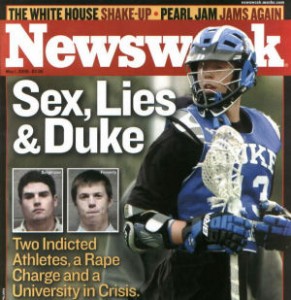Duke and Sex. Sex and Duke. The two seem inextricably linked in the public consciousness. But I’m here to let you in on a little secret. Are you ready? Here goes:
Duke has been lying to us about sex.
I know what you’re thinking: How can Duke lie to me about sex? I knew everything there was to know about sex by the time I was twelve. I haven’t taken any Women’s Studies classes and I skipped the O-Week sex talk, so Duke hasn’t really taught me anything about sex. Not true.
You see, Duke social life is filled with rules and expectations about sex. And, because it seems that Duke can’t go two years without some sort of sex scandal popping up, the media plays a pretty significant role in how the average Duke student understands sex. As a result, many of Duke’s dominant sexual narratives, scripts, and assumptions are flawed at best and catastrophic at worse. I’d like to debunk three myths perpetuated by Duke culture.
A Self-Fulfilling Prophecy: Hookup Culture Only Exists Because We Let It
 I had heard all about “hookup culture” before I ever set foot on a college campus. Old people and conservatives love to point to hookup culture as a symbol of the promiscuity, sinfulness, and immorality of my generation (although, there’s increasing evidence that generational differences in sexual behavior aren’t substantial). Young people love to use hookup culture as a scapegoat for their social concerns or an explanation for sexual behavior that may not align with their values.
I had heard all about “hookup culture” before I ever set foot on a college campus. Old people and conservatives love to point to hookup culture as a symbol of the promiscuity, sinfulness, and immorality of my generation (although, there’s increasing evidence that generational differences in sexual behavior aren’t substantial). Young people love to use hookup culture as a scapegoat for their social concerns or an explanation for sexual behavior that may not align with their values.
Duke social culture, with its “work hard play hard” (another annoying social life cliché) atmosphere, is particularly susceptible to this designation. Students, professors, and administrators all throw around the term “hookup culture” as though it is a phenomenon unique to Duke, and the term is rarely used in a positive context. From the moment freshman arrive on campus, they are inundated with descriptions of the “hookup culture.” Students feel that they have to be “hooking up” to be normal, and begin to wonder what’s wrong with them if they don’t immediately start engaging in casual sex. In this way, hookup culture quickly becomes a self-fulfilling prophecy as freshmen scramble to find “hookup buddies” during their first few months at school.
Our fixation on “hookup culture” annoys me. First, there’s my annoyance with the word “hookup,” which is used so often to describe so many different situations that it is rendered meaningless. Beyond that, I’m honestly just confused about why we’re all so obsessed with talking about “hookup culture.” If we really do think casual sex is problematic or inhibits the type of social relationships we want, lets stop perpetuating this idea that “everyone is hooking up” (because they aren’t). On the other hand, if we don’t think there’s anything shameful about casual sex, lets stop trying to mask it with this ambiguous “hookup culture” designation. Either way, I propose we retire the term “hookup culture,” the sooner the better.
Belle Knox May Be A Duke Woman, But She Does Not Speak For Me
 Oh, Belle. I was conflicted about whether or not to even address her in this post. After that whole story unfolded, it seemed like every Duke slacktivist rushed to claim an opinion. To be honest, I don’t really see it as my place to take a public stance on her decisions or her character. What she’s doing is perfectly legal, and I generally see no real point in either condemning or lauding her.
Oh, Belle. I was conflicted about whether or not to even address her in this post. After that whole story unfolded, it seemed like every Duke slacktivist rushed to claim an opinion. To be honest, I don’t really see it as my place to take a public stance on her decisions or her character. What she’s doing is perfectly legal, and I generally see no real point in either condemning or lauding her.
That said, I will take a stance on how her use of the Duke brand in her upsettingly violent pornography affects other Duke women, myself included. I worry that Ms. Knox, who often rushes to emphasize her identity as a feminist and a Duke woman, affects perceptions of the rest of us. If the most prominent and recognizable female Duke undergraduate actively participates in scenes involving violence (choking, having her head smashed into a mirror, being spit on, etc.) and rape, what message might that be sending other people, especially men, about how to treat Duke women? If we don’t speak up and say something, this violent behavior will very quickly become normalized.
So, Belle Knox can continue making her violent rape porn. I find it degrading and offensive, but I’m not stopping her. But let me make this very clear: Belle Knox does not speak for all feminists. She does not speak for all university students. She does not speak for all Duke women. Belle Knox does not speak for me.
2-8%: Why The Duke Lacrosse Case Is The Exception, Not The Rule
 I know, I know. I almost made it through an entire post about sex at Duke without talking about it. Sorry, y’all. Entire books have been written on this subject, and I’m not going to try to get into the many racial, socioeconomic, and political factors at play. What I will say is that the Duke lacrosse case may have happened eight years ago, but that doesn’t mean that it’s not still affecting how Duke students understand rape. If you Google “Duke rape,” you will find pages and pages of articles about the Duke lacrosse case. No links to the Office of Student Conduct of the Women’s Center (I gave up searching after the 15th page of results). It’s clear that this moment in our history still dominates the narrative of rape at Duke – and not in a good way.
I know, I know. I almost made it through an entire post about sex at Duke without talking about it. Sorry, y’all. Entire books have been written on this subject, and I’m not going to try to get into the many racial, socioeconomic, and political factors at play. What I will say is that the Duke lacrosse case may have happened eight years ago, but that doesn’t mean that it’s not still affecting how Duke students understand rape. If you Google “Duke rape,” you will find pages and pages of articles about the Duke lacrosse case. No links to the Office of Student Conduct of the Women’s Center (I gave up searching after the 15th page of results). It’s clear that this moment in our history still dominates the narrative of rape at Duke – and not in a good way.
The fact that the most notorious rape case in a college’s history turned out to be a false accusation very much affects how we talk about rape on campus (not just on our campus, but on campuses around the world). This case was one of the only 2-8% of rape cases involving a false accusation (a rate comparable to crimes like grand theft auto), and yet we refuse to accept the rarity of false accusations of rape. Instead, we blame and question the victim in ways that we never would with any other type of crime.
Our victim-blaming and victim-doubting tendencies have roots that go much deeper than any single rape case. This “she must be lying!” attitude is a prime example of our culture’s distrust of women. It’s why we use terms like “forcible rape” or “legitimate rape,” implying that there are “illegitimate victims.” It’s why we ask, “what was she wearing?” instead of “why did he rape her?” It’s why 97% of rapists never spend a day in jail.

Gppd article,Katie